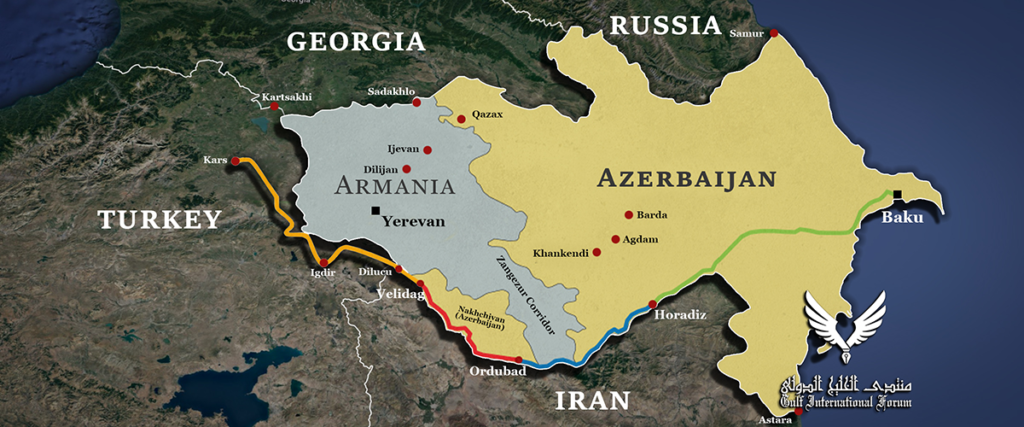Building Infrastructure is not Always the Drive to Regional Integration and Trade Development Between Neighboring and Peripheral States.
Here is a Case Study of Countries of the South with Divergent Interests and Diversified Geo-trade Aims along with Regional Ambitions that can create Multiple Hurdles for Development.
The Zangazur Corridor a project of roads to connect Azerbaijan to its Nakhchivan exclave, passes through Armenia’s southern Syunik region, while is supported by Russia, it is seen as a threat by their ally, Iran. Tehran considers the Zangazur Corridor a project aiming to divert and disrupt its trade routes and neutralize the corresponding geopolitical and regional impact.
The Zangazur Corridor is a proposed transport route connecting mainland Azerbaijan to its Nakhchivan enclave, passing through Armenia’s southern Syunik region.
The Zangezur corridor[a] (Armenian: Զանգեզուրի միջանցք, romanized: Zangezuri mijantsk; Azerbaijani: Zəngəzur dəhlizi) is a concept for a transport corridor[9][10] which, if implemented, would give Azerbaijan unimpeded access to Nakhchivan Autonomous Republic without Armenian checkpoints[11][12] via Armenia’s Syunik Province[13] and, in a broad sense, for the geopolitical corridor[14] that would connect Turkey to the rest of the Turkic world thereby “uniting it”.[15][16] The concept was not part of the 2020 Nagorno-Karabakh ceasefire agreement but was introduced to the geopolitical lexicon later by Ilham Aliyev.[17] It has since been promoted by Azerbaijan and Turkey,[18] while Armenia has steadily objected to it, asserting that “corridor logic” deviates from the ceasefire statement, and that it is a form of propaganda.[19]
The terminology, the potential routes, and the modes of transport connections have since been points of contention between Azerbaijan and Armenia, which have still maintaining a mutual blockade since 1989.[b] Azerbaijan has initiated construction projects on its territory presenting them as part of the implementation of a so-called “Zangezur corridor” and threatening that should Armenia not want it, Azerbaijan “will decide it by force”.[21]
During 2021 trilateral talks, Armenia expressed willingness to participate in rebuilding the Soviet-era railway links historically connecting Azerbaijan and Nakhichevan, which Azerbaijan interpreted as Armenian consent to the “Zangezur corridor”. According to Russia, the third party, what is being discussed is unblocking regional communications, and not creating a “corridor”.[22] [23]

To better apprehend what is at stake in the project of the Zangazur Corridor, here are insights presented by Razi Nurullayev who is a Member of the Parliament of Azerbaijan and has not only knowledge but practical intelligence about the various elements intricating and imbricating within these regional reactions and positions taken or identified in this infrastructural project that in other circumstances is considered as the right orientation and decision to build the foundations of regional and inter-nations cohesion, complementarity and integration.
It seems as we say in Islamic Countries: “Haramoun Alikoum Wa Hallal Aliya.”
Good Day and Good Reading.
• Razi Nurullayev • Member of the Parliament of Azerbaijan •
The Zangazur Corridor is a proposed transport route connecting mainland Azerbaijan to its Nakhchivan exclave, passing through Armenia’s southern Syunik region. This corridor is part of a broader regional infrastructure plan following the 2020 Karabakh war, with Azerbaijan advocating for its development under agreements brokered by Russia.
Lately, Russia has demonstrated support for the Zangazur Corridor, seeing it as a way to boost regional connectivity, solidify its influence in the South Caucasus, and diversify its transport routes due to the imposed Western sanctions. Moscow views this corridor as a strategic link between Europe and Asia, as do Azerbaijan and Turkey, aligning it with their geopolitical and economic interests.

An Azerbaijani national flag flies next to the medieval Khudaferin bridge in Jebrayil district at the country’s border with Iran – the territories recaptured from Armenian forces in fierce clashes over the disputed Nagorno-Karabakh region, December 2020 (AFP)
However, Iran is vehemently opposed to the project. Tehran sees the corridor as threatening its regional influence, fearing it could cut off direct land access to Armenia and disrupt its trade routes. Additionally, Iran worries about increasing Turkish and Azerbaijani influence in the region, which could shift the balance of power along its northern borders. This was probably the case because Iran agreed to a transit route connecting western Azerbaijan with its exclave of Nakhchivan through Iran via a bridge over the Aras that connects the two countries.
This geopolitical tug-of-war underscores the complex dynamics, as regional powers vie for influence in the Caucasus, with the Zangazur Corridor at the heart of the dispute. In this dispute, Armenia is a stubborn neighbor working for its harm. It must overcome its anger and try to abate hostility against this project.
On the other hand, Armenia’s opposition to the Zangazur Corridor could be a strategic mistake. The corridor presents a unique regional connectivity and economic growth opportunity, potentially turning Armenia into a key transit hub between Europe and Asia. Blocking it may isolate Armenia further and deepen economic challenges while Azerbaijan and Turkey strengthen their positions. Instead of resisting, Armenia could benefit from engaging in dialogue and leveraging the corridor for its advantage.
Hopefully, Armenia will be able to reestimate the advantage of the Zangazur project for the whole region.
Said Cherkaoui Ph.D. – Said El Mansour Cherkaoui Ph.D. – 9 17 24 –
Email: saidcherkaoui@triconsultingkyoto.com
Websites:
English Version: https://lnkd.in/gGKm9rNq
French Version: https://lnkd.in/gvWtimvs
#Karabakh #Nakhchivan #Nakhchivanenclave #Armenia #peaceagreement #Syunikregion #Russia #Iran #Infrastructure #Development #Geopolitics #Regionalintegration #Internationaltrade #Internationalbusiness #Internationalfinance #Investment #Saidelmansourcherkaoui #Triconsultingkyoto #Trickusa



Leave a Reply